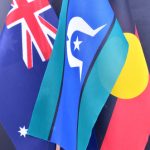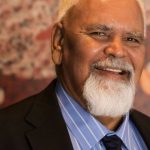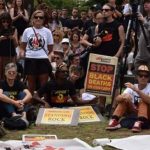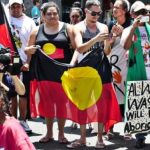Treaty Now! Uluru Summit Rejects Constitutional Recognition
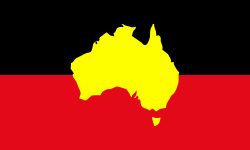
Last week’s Uluru summit was the culmination of a six-month process that saw the Referendum Council travel the country carrying out the dialogues. These were a series of twelve meetings of Aboriginal and Torres Strait Islander people to discuss the issue of recognising Indigenous people in the Australian Constitution.
The response of the summit delegates was to ultimately reject the proposition of constitutional recognition, in favour of a commission to supervise the process of establishing treaties, and a constitutionally enshrined Indigenous representative body.
Last Friday, the council released the Uluru Statement from the Heart – a document covering these proposals. It also outlines that “substantive constitutional change and structural reform,” will allow First Nations people’s sovereignty to “shine through.”
An Uluru delegate weighs in
Tauto Sansbury is the chair of the South Australian Aboriginal Congress. He’s a long-time advocate for Indigenous treaties and rejects the notion of constitutional reform as a mere token gesture.
The SA Aboriginal Congress represents the 27 First Nations groups in South Australia. Since December last year, the local nations have been in consultation with the SA government over the establishment of a series of state-wide treaties.
Mr Sansbury attended the Uluru summit. “I felt there was a change in the air at Uluru,” he told Sydney Criminal Lawyers®. “On the second day, we focused a lot of discussion on what treaty would mean for us, and the importance of pushing that agenda.”
According to Sansbury, while some of the delegates were pushing for constitutional recognition – which is the federal government’s position – it was the grassroots will of the people that won out at the end of the day.
“We’re not talking about just being placed in the constitution and recognised as being Australians,” the Narungga elder explained. “Because we find that we would most probably lose more than we would get out of that.”
Voices of dissent
However, not all those gathered were in agreement with the way the discussion was going. On the second day of the summit, at least seven delegates from NSW and Victoria walked out of the proceedings, claiming “the Noel Pearson roadmap” was only option under consideration.
Sydney-based Wiradjuri elder Jenny Munro declared, “I have asked how does our sovereignty remain intact when we go into the white man’s constitution – that is about validating their sovereignty on our land, not ours.”
Indeed, there does seem to be some ambiguity in the Uluru statement as to the rejection of recognition in the constitution, while at the same time seeking constitutional reforms.
Earlier this month, the Aboriginal Tent Embassy posted an image on Facebook stating, “Vote ‘No’ to Constitutional Reform.”
“We as sovereign First Nations people reject constitutional recognition. We do not recognise the occupying power or their sovereignty,” Victorian delegate Lidia Thorpe told NITV. The Gunai and Gunditjmara woman explained that they were demanding “a sovereign treaty, with an independent sovereign commission.”
A shift in the conservative agenda
Cape York leader Noel Pearson has been a long-time advocate for constitutional recognition. He was a member of the expert panel, which was tasked with providing recommendations on how Indigenous recognition in the constitution should be actualised in 2010.
The panel’s report was tabled in January 2012. And from there the group Recognise was launched in 2013 to promote constitutional changes. Last year, Recognise were sending out delegates – like ABC journalist and Wiradjuri man Stan Grant – to spruik recognition in regional areas.
But both Pearson and Grant appeared on the ABC’s Q&A last Monday night embracing the new vision of change embodied in the Uluru statement, having seemingly left behind their previous conservative stance on constitutional recognition.
However, the representatives of the Referendum Council that appeared on Q&A propose that the Indigenous representative body be provided for through a process of constitutional change prior to the establishment of any treaties.
Pearson began calling for such an Indigenous representative body back in 2014. He’s now advocating for a referendum to be held next year on the Uluru proposals.
Although, Australian Indigenous health minister Ken Wyatt is still calling for a referendum based on the earlier constitutional recognition model. Mr Sansbury said the minister “needs to step back and accept the vote that came out of Uluru – accept that now and start to build on it.”
What about those treaties?
Since the summit, much of the national debate has focused upon the proposed Indigenous representative body embedded in the constitution.
However, the delegates that produced the Uluru statement and those that walked out of the summit have both called for the establishment of a series of treaties between each of the land’s Indigenous nations and the federal government, along with an independent commission to oversee this process.
So regardless of whether any changes to the constitution are made, the idea of treaty is very much at the forefront of Indigenous discussions in this country. And many believe that treaties should be established before any constitutional changes are even considered.
Treaty now
A treaty is a formal settlement or agreement made between independent states. Treaties establish binding obligations and formal relations between two parties.
As Terry Mason, curriculum developer and lecturer at the Institute of Koorie Education at Deakin University, has pointed out treaties would deal with matters of self-determination, land rights and custodianship.
The Uluru Statement explains that the culmination of their agenda is Makarrata, which is a Yolngu word that means “the coming together after a struggle.” The statement reads, “We seek a Makarrata Commission to supervise a process of agreement-making between governments and First Nations.”
Australia is the only Commonwealth country not to have established a treaty, or treaties, with its First Peoples. Both New Zealand and Canada have treaties in place that incorporate compensation, as well as land and fishing rights.
And many Indigenous and non-Indigenous voices in Australia are now it making clear that it’s time for the federal government to establish formal agreements with the sovereign people of this land – people that have never ceded sovereignty.
The need to change
“Malcolm Turnbull missed an opportunity to embrace this and say, ‘Yes. We need to discuss this seriously and move forward,’” Sansbury explained. Over the weekend, the prime minister warned at a 1967 referendum anniversary lunch that Australians are usually “conservative” about constitutional change.
Mr Sansbury explained that since the time the British began colonising this continent, life hasn’t improved for its First Peoples. “A lot of our people have lost lives to get to this day,” he continued. “This is a fight that started in 1788, and for me, it’s a culmination of something great.”
“Australia needs to settle its affairs with the traditional owners of this country,” Sansbury concluded.


